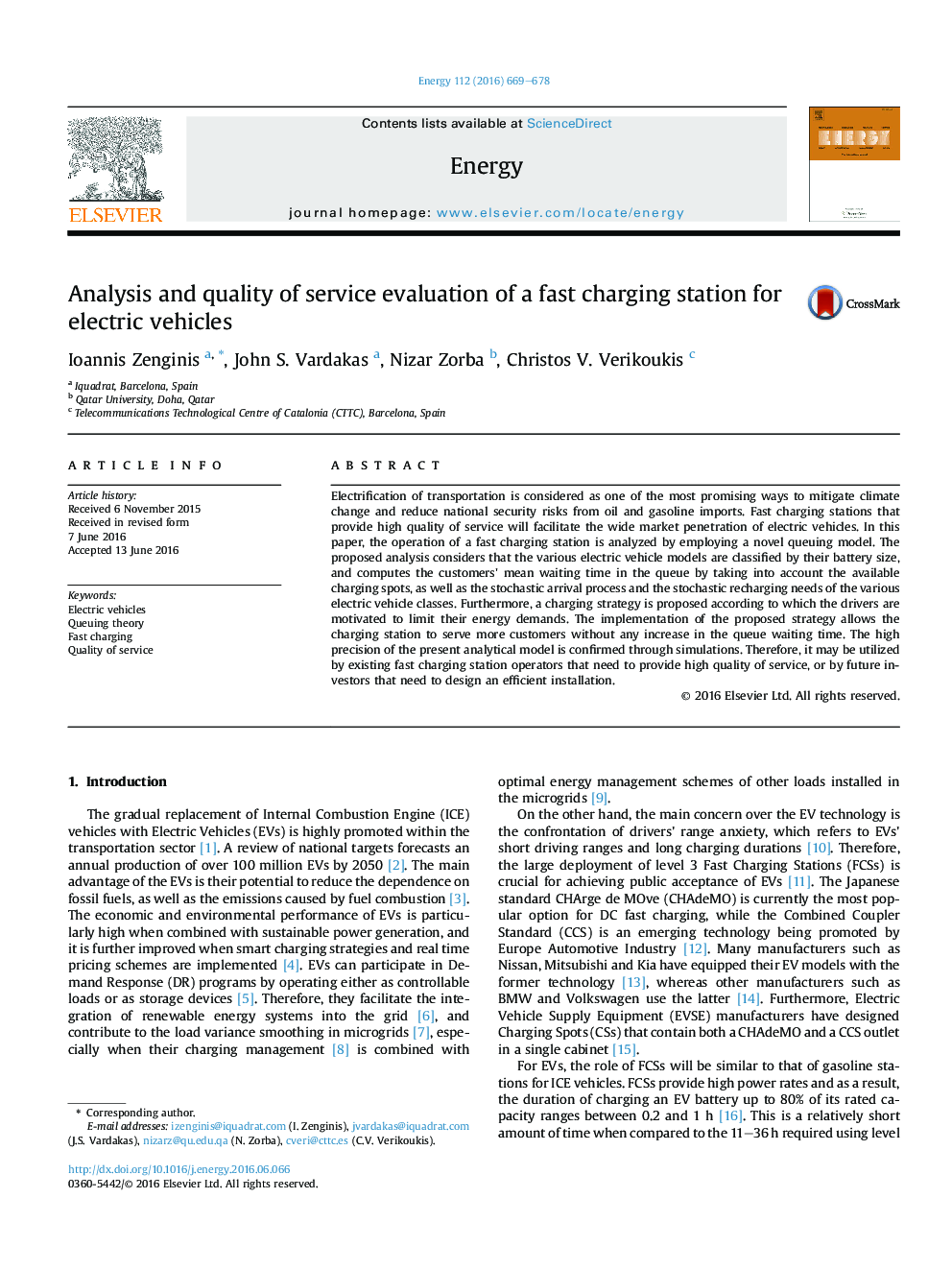| کد مقاله | کد نشریه | سال انتشار | مقاله انگلیسی | نسخه تمام متن |
|---|---|---|---|---|
| 8073060 | 1521436 | 2016 | 10 صفحه PDF | دانلود رایگان |
عنوان انگلیسی مقاله ISI
Analysis and quality of service evaluation of a fast charging station for electric vehicles
ترجمه فارسی عنوان
تجزیه و تحلیل و کیفیت خدمات ارزیابی یک ایستگاه شارژ سریع برای خودروهای الکتریکی
دانلود مقاله + سفارش ترجمه
دانلود مقاله ISI انگلیسی
رایگان برای ایرانیان
کلمات کلیدی
وسایل نقلیه الکتریکی، نظریه صف بندی، شارژ سریع کیفیت خدمات،
ترجمه چکیده
الکتریکی کردن حمل و نقل به عنوان یکی از راهکارهای امیدوار کننده برای کاهش تغییرات اقلیمی و کاهش خطرات امنیت ملی از واردات نفت و بنزین محسوب می شود. ایستگاه های سریع شارژ که کیفیت بالای خدمات را ارائه می دهند، نفوذ وسیع بازار خودروهای الکتریکی را تسهیل می کنند. در این مقاله، بهره برداری از یک ایستگاه شارژ سریع با استفاده از یک مدل صف جدیدی تحلیل می شود. تجزیه و تحلیل پیشنهاد شده است که مدل های مختلف خودرو الکتریکی با اندازه باتری آنها طبقه بندی می شود و میانگین زمان انتظار مشتریان در صف را با در نظر گرفتن نقاط شارژ در دسترس، و همچنین روند ورود تصادفی و نیازهای شارژ تصادفی، محاسبه می کند. کلاس های مختلف وسایل نقلیه الکتریکی. علاوه بر این، یک استراتژی شارژ ارائه می شود که بر طبق آن رانندگان انگیزه دارند تا تقاضای انرژی خود را محدود کنند. پیاده سازی استراتژی پیشنهادی به ایستگاه شارژ اجازه می دهد تا مشتریان بیشتری را بدون افزایش در انتظار انتظار صفر ارائه دهد. دقت بالا از مدل تحلیلی حاضر، از طریق شبیه سازی ها تایید شده است. بنابراین، ممکن است توسط اپراتورهای سریع شارژ سریع که نیاز به ارائه خدمات با کیفیت بالا دارند، یا توسط سرمایه گذاران آینده که نیاز به طراحی یک نصب و راه اندازی کارآمد دارند، مورد استفاده قرار گیرد.
موضوعات مرتبط
مهندسی و علوم پایه
مهندسی انرژی
انرژی (عمومی)
چکیده انگلیسی
Electrification of transportation is considered as one of the most promising ways to mitigate climate change and reduce national security risks from oil and gasoline imports. Fast charging stations that provide high quality of service will facilitate the wide market penetration of electric vehicles. In this paper, the operation of a fast charging station is analyzed by employing a novel queuing model. The proposed analysis considers that the various electric vehicle models are classified by their battery size, and computes the customers' mean waiting time in the queue by taking into account the available charging spots, as well as the stochastic arrival process and the stochastic recharging needs of the various electric vehicle classes. Furthermore, a charging strategy is proposed according to which the drivers are motivated to limit their energy demands. The implementation of the proposed strategy allows the charging station to serve more customers without any increase in the queue waiting time. The high precision of the present analytical model is confirmed through simulations. Therefore, it may be utilized by existing fast charging station operators that need to provide high quality of service, or by future investors that need to design an efficient installation.
ناشر
Database: Elsevier - ScienceDirect (ساینس دایرکت)
Journal: Energy - Volume 112, 1 October 2016, Pages 669-678
Journal: Energy - Volume 112, 1 October 2016, Pages 669-678
نویسندگان
Ioannis Zenginis, John S. Vardakas, Nizar Zorba, Christos V. Verikoukis,
